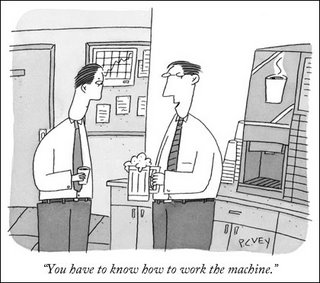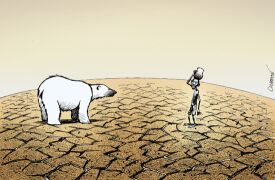Published in The New Yorker August 30, 2004
Published in The New Yorker August 30, 2004 Artist:
Drew DernavichOutsourcing has got under skin of the West. The subject has reached drawing rooms, restaurants, bedrooms, parliaments, courts and so on.
But no one saw it reaching heaven and even there it is not a very easy subject.
Wings are manufactured in hell as labour is cheaper there.
Notice arrow on carton showing which way is up.There is an apparent calm in the picture. It may not be always so.
NYT of Dec 24 2006 has an article "Goodbye, Production (and Maybe Innovation)" which says:
"AMERICAN manufacturers no longer make subway cars. They are imported now, and the skills required to make them are disappearing in the United States. Similarly, imports are an ever-bigger source of refrigerators, household furnishings, auto and aircraft parts, machine tools and a host of everyday consumer products much in demand in America, but increasingly not made here.
Import penetration, as it is called, worried economists and policymakers when it first became noticeable 20 years ago. Many considered factory production a crucial component of the nation’s wealth and power. As imports gained ground, however, that view changed; the experts shifted the emphasis from production to design and innovation. Let others produce what Americans think up.
Or as Mark Zandi, chief economist at
Moody’s Economy.com, put it: “We want people who can design iPods, not make them.” But over the long run, can invention and design be separated from production?
“Most innovation does not come from some disembodied laboratory,” said Stephen S. Cohen, co-director of the Berkeley Roundtable on the International Economy at the
University of California, Berkeley. “In order to innovate in what you make, you have to be pretty good at making it — and we are losing that ability.”"
Heaven cannot wait! It has to do something about it but doesn't know what.







